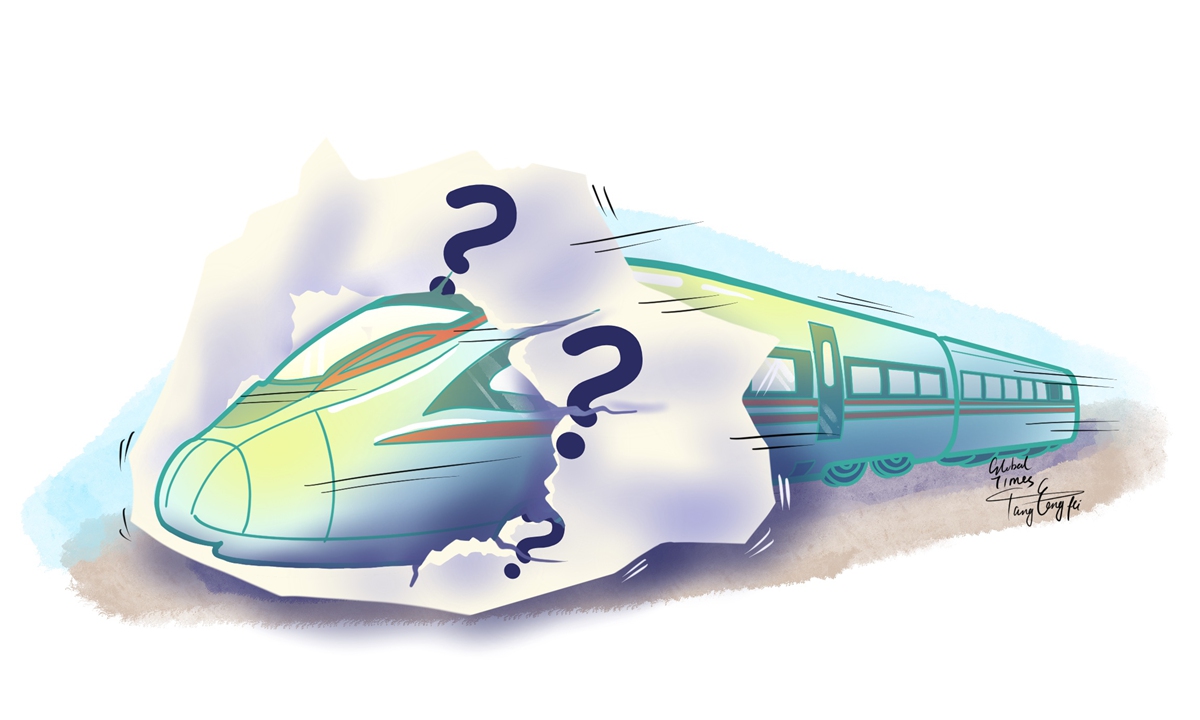COMMENTS / EXPERT ASSESSMENT
Jakarta-Bandung HSR to benefit Indonesia immensely

Illustration: Tang Tengfei/Global Times
As Indonesia plans to relocate its national capital in 2024, the country's first high-speed railway constructed by Chinese firms and linking its current capital Jakarta and the city of Bandung in West Java may need to "take up to 20 years to become profitable," according to some estimations.
As always, the presence of Chinese firms behind the project emerged as a central issue among foreign media. "The Belt and Road Initiative (BRI) project also faces a cost overrun of about $2 billion," the Reuters reported, citing an executive from the China-Indonesia consortium building the railway.
Many BRI projects like the Jakarta-Bandung High Speed Railway (HSR) are mega infrastructure projects taking years to finish and likely encounter various difficulties during the procedure, including a once-in-a-century situation of relocating the country's capital city. Yet, a delayed break-even point or a single project's rate of return is not a core factor in defining the significance of projects.
The Jakarta-Bandung HSR, as a BRI project, is China's first overseas high-speed rail project and the first of its kind in Southeast Asia with a maximum design speed of 350 kilometers (km) per hour.
For a country like Indonesia, with a large population and insufficient transportation network, the HSR is of great significance for the country to facilitate its economic and social development, especially as the country has seen rapid economic growth in recent years and a great growth potential.
In addition to the profit prospect of the project itself, what is more important is that it can promote the upgrading of railway technology in Indonesia, the rapid development of relevant industrial chain, manufacturing and tourism industries, boosting employment and new businesses along the railway and neighboring cities.
Whether Indonesia relocates its capital or not, Jakarta will remain a leading metropolis and one of the largest cities in Southeast Asia, and Bandung is the fourth largest city in the country and a famous tourist resort. With a design speed of 350 km per hour, the railway will cut the journey between the two cities from more than three hours to 40 minutes.
Is such kind of transportation project simply being built for selling tickets and delivering a profit? Clearly not.
Countries and regions making heavy investment in building infrastructure have long-term targets and strategic planning considerations. Improving transportation infrastructure can inject enormous momentum for the growth of many industries, paving the way for economic and social development. China itself offers a playbook of how high-speed railways are strongly boosting economic growth in spite of some routes still losing money since launch.
Since the first day of the BRI being proposed, the Western media has been busy attempting to vilify the massive infrastructure program, fabricating so-called "debt trap" stories, in their sinister attempt to drive wedges between China and other countries joining the iconic framework.
Facts speak louder than words. The number of BRI partners has been expanding and cooperative projects have been generating tangible benefits for local residents in their daily lives. Taking the uncompleted Jakarta-Bandung HSR for instance, it has trained more than 1,500 local skilled workers. And after the Jatigede Dam in Indonesia is completed, which is also being constructed by Chinese firms, a yearly revenue of $40 million will be delivered to the coffers.
The author is a reporter with the Global Times. bizopinion@globaltimes.com.cn
